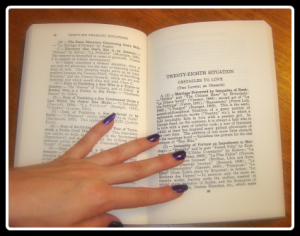Prologue
“Pinky, are you pondering what I’m pondering?”
“Well, I think so, Brain — but if Jimmy cracks corn, and no one cares, why does he keep doing it?”
Sorry, inklings. I know I had you going pretty good there for a second. But, sadly, today’s article has absolutely nothing to do with Pinky and The Brain. That quote popped into my head as I sat down to write what was to be my first sentence, beginning with, “As I sat here, pondering…”
“Pondering” naturally led to genetically engineered, cartoon white mice with dreams of world domination. Don’t ask me why my brain works that way. It just does. And since Aaron lets me get away with writing anything here (as long as I don’t reveal the details of his dreams of world domination), you get to share in the joyous meanderings of my peculiar mind. Ain’t that speshul?
*ahem*
So. Anyway. As I sat here, pondering the myriad of possible WILAWriTWe topics, through my peculiar mind flashed not only the image of cranially enhanced rodents, but also the memory of a book I keep tucked away on my shelf of writing-related tomes.
Main Body
The book in question, gentle readers, is The Thirty-Six Dramatic Situations by Georges Polti*. Way back when I was a little whippersnapper convinced she would publish her first novel by age 15 (to beat out S. E. Hinton, you understand), my mother bought me a slew of writing how-tos, most of which I’ve looked at for years but haven’t read cover-to-cover. Mr. Polti’s, for instance, was originally published in 1921 — and if I’m gonna read non-fiction, I’d like it to be a bit further removed from the thees and thous of the King James era. (Not that Polti approaches such language, but still, his tone and style are cumbersome for an educated 33-year-old of 2010 to digest. For a teenager in 1992, “palatable” never even entered into it.)
What’s more, Polti’s alphabetized index comprises a full third of the book, which is way more intellectual information than I want to process when I’m in creative mode.
But. Polti’s book does serve as interesting reference material, especially because of his basic premise: that there’s no such thing as an original plot. Humankind exhausted its store of fresh, new situations long ago; “there is nothing new under the sun” (The Bible, Ecclesiastes 1:9). On the title page, he quotes:
Gozzi maintained that there can be but thirty-six tragic situations. Schiller took great pains to find more, but he was unable to find even so many as Gozzi.
–Johann Wolfgang von Goethe
What Gozzi, Schiller, and Goethe claim, Polti makes his own and runs with. He spends 5.3 pages defending his thesis, then goes on to present the 36 definitive situations and their variations. Some of these include (in random order):
Slaying of a kinsman unrecognized
The Enigma
Crimes of love
Obtaining
Daring enterprise
Deliverance
Loss of loved one
Erroneous judgment
All sacrificed for a passion
Fatal imprudence
Madness
Revolt
Rivalry of kinsmen
Abductionetc.
Polti presents each situation with its elements and its variations, as well as examples. For instance, for the situation he labels “Obtaining,” he presents the following elements:
A Solicitor and an Adversary Who is Refusing, or an Arbitrator and Opposing Parties
and variations, with selected examples:
A — Efforts to Obtain an Object by Ruse or Force: — the “Philoctetes” of Aeschylus, of Sophocles and of Euripedes; “The Minister’s Ring” by Vishakadatta
B — Endeavor by Means of Persuasive Eloquence Alone: — “The Desert Isle” by Metastasio; Scene 2 of Act V of Shakespeare’s “Coriolanus”
C — Eloquence With an Arbitrator: — “The Judgment of Arms” by Aeschylus; “Helen Reclaimed” by Sophocles.
And, lest my article degenerate into the dry academia of pseudo-intellectualization, allow me to remark that Polti has a greater affinity for the hyphen than do I, which is quite the feat, lemme tell ya.
Oy vey!
Conclusion
I haven’t the faintest clue if Polti’s thesis stands up to modern literary research — and I ain’t gonna investigate further, neither. 😉 I remember, once-upon-a-time, thinking that 36 seemed awfully limiting…but now, after experiencing writer’s block and the joy of its lifting, I believe 36 is about as liberating as it gets. And with that kind of freedom staring me in the face, I don’t need to look further for something I can use.
Think about it. You’re stuck. Your main character’s stuck. You’ve written both of you into a tight squeeze you can’t extricate yourselves from. You know the hopeless, helpless, enraging, demoralizing frustration of which I speak. You sit down to write, and nothing happens — because you have absolutely no clue where to go next with this thing that’s supposed to morph into a story, and an attention-grabbing one at that.
You’re in this hideous, dark cave with no way out…
…except, in truth, you have at least 35 escape routes.
One of 36 routes, you used to get in — but you have 35 different ways of getting out. These are 35 tunnel entrances, and you have the leisure and the luxury of choosing your favorite one, for every single one is a happy-ending exit. Not only that, but each of them branches out into multiple side tunnels — let’s call ’em “variations,” what say? — each of which also leads to the blessed freedom of rediscovering the entertaining pace of your story.
So, writer, find yourself a Polti. Either a copy of his book, or some other resource that lists plot types. If nothing else, peruse that truncated list of options I gave you up there and confront your main character with one of them. How s/he deals with the obstacle is what will extricate both of you and get you where you need to be.
And that’s WILAWriTWe!
Epilogue
* No offense to the long-deceased Mr. Polti…but that makes me think George’s poultry. Weirdly-functioning brain again.
Photo credit Julie V. Photography.






